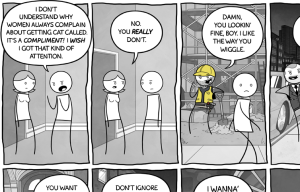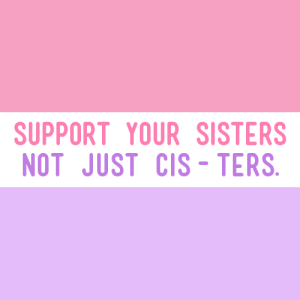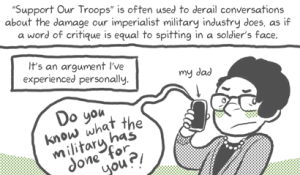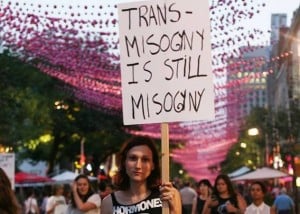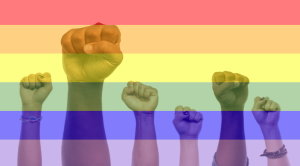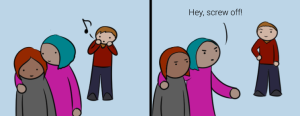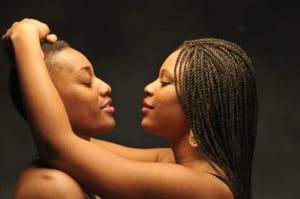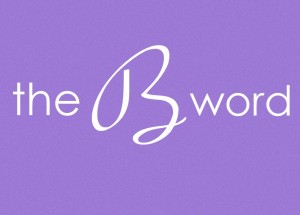
Source: Melissa A. Fabello
I’ve heard this crazy rumor somewhere that feminists don’t have a sense of humor.
Not so.
But since humor frequently hinges on a scenario of mutually understood cultural expectations subverted, it actually hinges on your core beliefs.
Since feminism is not yet a mainstream cultural understanding, the heart of humor is just different.
That being said, I’ve also heard it said that feminists should loosen up about general cultural norms such as language and humor.
Rape jokes, homophobic, transphobic, blonde/brunette/redhead jokes, and the use of mostly feminized linguistic attacks… I get it. I just don’t find bigotry funny.
Some detrimental cultural ideals run deep – so deep that no one even questions origins or implications, or the fact that they might operate as support beams of status quo oppression.
Let’s take the word “bitch” for example.
The word “bitch” is just about everywhere: casual conversation, heated arguments, television show titles, magazines, and in a myriad of other articles. It tends to just make people crack up for lots of different reasons, so it seems like a super malleable and fun word, right?
Well, in fact, many of the seemingly different uses boil down to the same message regarding gender.
That’s not to say it’s a no-no word or that these are the only things to consider when sprinkling it into conversation, if you so choose.
Rather, this is just an exercise in identifying some potentially hibernating connotations that can perpetuate harmful gender stereotypes.
The goal is that by identifying and considering these aspects in addition to other intended messages, we can be in control of the messages we send out into the world.
So here are a few common uses of the word “bitch” and a few of their rampant (and problematic) subtexts.
1. Bitch as Denoting ‘Other Women’
There exists an issue of demonizing (by way of claiming not to be like) “other” women – which exemplifies internalized sexism.
The problem with lumping virtually all women into a specific group identity is that it traditionally calls upon all of patriarchal society’s most harmful stereotypes.
One assumes that most girls are… what, exactly?
That very phrase – “most girls” – calls forth connotations of catty, shallow, vain, fake, hyper-emotional, and hyper-feminine, particularly when used in this context.
When I began to deconstruct “bitch” as a cultural and linguistic phenomenon, it became apparent that many aspects hinge on female competition. And female competition is frequently instigated by internalized messages of sexism.
This phrase constructs a hierarchy with traditional images of femininity at the bottom, the stand-out, masculinized exception of a woman (or two) sort of straddling the line of androgyny like Wonder Woman, and then traditional masculine stereotypes at the top.
Beyond the assumption that masculinity is superior to femininity, it also sets different categories of femaleness against each other.
I guess, with all of the struggles to communicate amongst female identifying individuals already, innate and dismissive language such as “Other women are such bitches!” adds another layer of struggle on top of all our unique journeys, and it is historically proven that the most effective way to drain power from any group is to divide and conquer.
So saying that other women are bitches can also be igniting a firestorm of sexist connotations we just don’t think about on a daily basis that is harmful both to other women and the speaker.
The first step to empowering individual women is to stop playing into grand schemes of misogyny.
2. Bitch as the (Preferable) Alternative to Traditional Femininity
The idea here is that a woman is this docile, diffident creature for visual consumption and general compliance, but I am a badass bitch.
Although this originally feels like the antithesis to the first issue, it actually incorporates many similar aspects of female competition as a means of perpetuating internalized sexism. In fact, it’s more like an extension of the first.
Idolizing the “bitch” role feels like reclamation of the term, and whether or not that is a successful use, pitting a “bitch” ideal against traditional femininity yields several damaging results.
Now you might be shaking your head saying that in this use, bitch feels empowering, and feminism is all about empowerment and girl power, right?
Well, Spice Girls references aside, the complicated thing about empowerment is that power is sometimes earned for one person by robbing (or at least subduing) another.
In this case, the empowered bitch status insinuates that there is an inherent flaw with female nature, that being born a woman relegates someone to subhuman status that certain super-women can transcend and defeat — but only super special ones!
It empowers the individual at the expense of the female gender at large.
This nontraditional bitch tends to be the most media-friendly and mainstreamed image of “strong” women because it’s most digestible to traditional patriarchal messages. Not to mention, it works to divide female identified individuals and pit us against each other.
I use the term “traditional femininity” loosely because just by flipping around the wording of a sentence involving the word bitch, the connotations can completely rearrange themselves (like the way they did between the first example and this one!).
If “bitch” is being reclaimed truly, it can’t be pitting certain brands of femaleness against others.
If empowerment is ever truly to be accomplished, it has to be through solidarity and support.
3. Bitch as the Successful Female
This use of bitch is problematic on a competitive level, but it also plays up sexist stereotypes like menstrual maniacs, hyperemotional incompetence, and female cattiness incurred by cultural messages that bombard media representations of women.
The media pits female characters against their bodies and physical appearances and female viewers against the pop-beauty-ideals of TV and advertisements.
The bottom line, and most gigantic and important ramification of these battles, is the fact that women don’t win them – not one specific woman, not a demographic, race, or class of women, and certainly not the everyday woman struggling for respect in daily life.
Even those images of perfection that are our idolized musicians, actresses, and models are not winning these battles.
Media win. Corporations win. Cosmetics companies, diet companies, and fashion companies win – by creating a need for their products and fulfilling them.
Perhaps more importantly, men win out on promotions, professional respect, and pay scale as a form of privilege – and not because individual men are acting out of misogyny or villainy.
They win the jobs that might benefit women, the benefits that might benefit women, and they win the respect and support of the very people (women) they are trampling over on their way to the top.
That’s not to say that calling a woman in power a bitch will earn her a demotion or pay-cut through some mystical telepathy. However, it is important to acknowledge a very real and pervasive form of male privilege that this language perpetuates.
Undermining other women in power — especially based on arbitrary details such as physical appearance, clothing choice, and sexuality — is undermining all women in all environments.
4. Bitch as Any Girl Skinnier or Prettier Than You
This phrase is something I’ve seen floating around social media memes in various forms.
I know it’s supposed to be witty and empowering to women who don’t conform to the waif-like size two that is so idealized in our culture. I know that it’s meant to empower women who feel belittled and insulted by the culture at large.
And yet…
The first problem is that shaming another body type to empower your own is just perpetuating the very core issue of body shaming.
The answer isn’t to transfer discrimination from one group to another — even if that group is currently privileged — but to eradicate discrimination.
The entire practice of comparing physical attributes with other women is that it encourages the very cultural practice of basing female worth on physical attractiveness that so many of us have felt personally harmed by.
It also encourages a mindset of competing for male attention, which perpetuates heteronormative stereotypes, female self-objectification, and transmisogyny.
Again, I do understand that these circulating graphics are intended to be funny. But it’s also important to examine what we’re saying by the jokes we make. In this case, there are very pervasive messages of female aesthetic as social currency.
If we really want to stop being defined by looks, a very important step is to stop defining ourselves and those around us by outward appearance.
If it’s not funny to define women by physical appearance, a lot of painful jokes will be nullified.
5. Emasculation of the Bitch
A man who shows emotion. A man who is empathetic, sympathetic, or comfortable with deep conversation. A man who is pacifist. A male vegetarian. A man who loses a bet or athletic competition.
“Bitch” is considered rock bottom identity for traditional masculinity based on the dominance, strength, and virility of cisgender, heterosexual men.
Any deviance from these stereotypes of masculinity could incur a bitch status, which insinuates (so very, very harmfully and wrongfully) homosexuality, transsexuality, asexuality, or a gentle and passive personality — to name a few.
This is no coincidence.
It is the exact inverse of its use regarding masculine-identified females.
If a woman calls herself a badass bitch, it is understood to be a gender-deviant association to strong femininity; if a man is called a bitch, it is understood as a gender-deviant as weak masculinity.
If you combine those two definitions, the message is that the strongest possible female is weaker than or equal to the weakest possible man.
That is why calling a man a bitch displays internalized sexism.
It traps both men and women into rigid gender roles that simply can’t be realistically fulfilling for every human in our culture, and it traps any outliers in the caste of the outcasts.
***
Books upon books could be written exploring and debating this word as a positive or negative catalyst for feminism — especially if you’re a super-nerdy, language-obsessive feminist like myself.
There are absolutely cases to be made for each aspect of the many different linguistic and cultural forms of bitch.
One thing to be aware of is the fact that words, such as bitch, that have existed and evolved for over a thousand years already hold a universe of utility in a single monosyllable.
Although it might seem eccentric to delve this deeply into a single word, consider how it has been used in your own life: How have other people used it toward you? toward other people around you? How have you used the word? What is the general intent and result of it?
One fun-loving use of the word is in playful banter among a group of closely-knit friends. I have a universe of respect for certain renowned and established publications that revel in its reclamation.
There are many other uses of bitch well worth discussing, dissecting, and even embracing.
But perhaps the most important exploration to consider is this: What is your relationship with the B-word?
Let us know in the comments!
Want to discuss this further? Login to our online forum and start a post! If you’re not already registered as a forum user, please register first here.
Kelsey Lueptow is a Contributing Writer at Everyday Feminism. Kelsey is a small town amateur yogi, poet, and feminist from Wisconsin. She’s a single mother and seasonal waitress working on a Bachelor’s degree in Creative Writing and Women’s Studies. Caffeine addict and book enthusiast, Kelsey spends her time playing with her son and hanging out at coffee shops. Read her articles here.
Search our 3000+ articles!
Read our articles about:
Our online racial justice training
Used by hundreds of universities, non-profits, and businesses.
Click to learn more
Most Read Articles
- « Previous
- 1
- …
- 30
- 31
- 32





